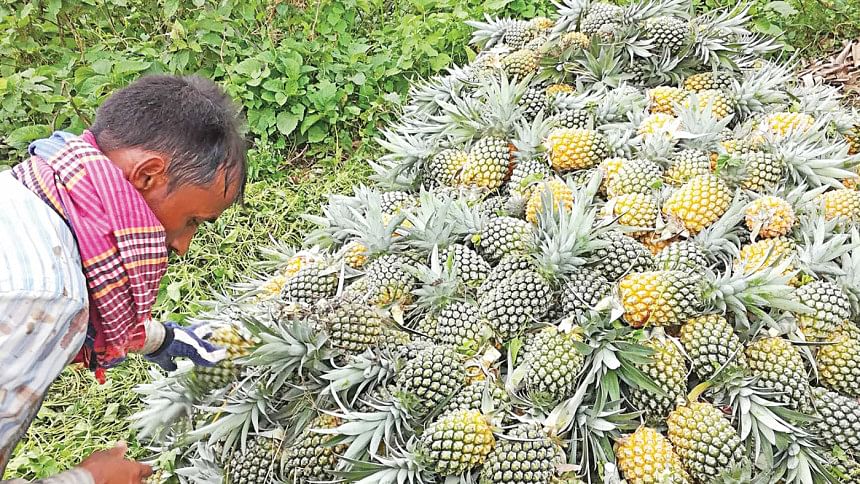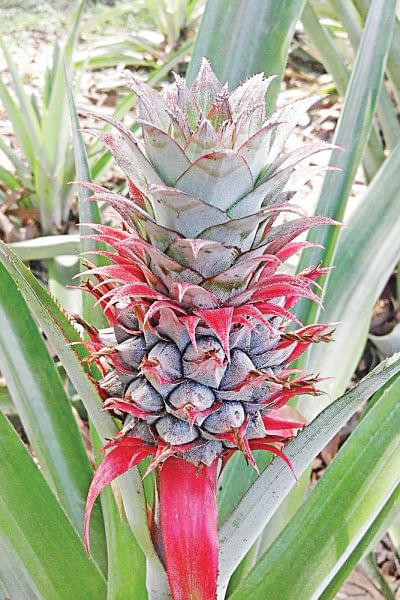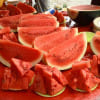Better pineapple yield brings cheers for farmers

The honey queen variety of pineapple, locally known as Joldungi, cultivated in the Madhupur Garo area has seen a better yield this year compared to the previous season thanks to favourable weather.
The mature, sweet and tasty fruit has already started to hit the market and is fetching better prices, making growers happy.
Joldungi pineapples are smaller in size but sweeter and tastier than other varieties.
Tangail's Madhupur upazila is the key growing region for the fruit in Bangladesh.
Nationally, the latest data on pineapple production from the Bangladesh Bureau of Statistics is not readily available. It is estimated that the country produced 208,000 tonnes of the fruit in 2020-21 and they were grown on around 35,000 acres of land.
Data from the Department of Agricultural Extension (DAE) showed 5.38 lakh tonnes of pineapples grew in 2021-22, up from 4.69 lakh tonnes a year ago.
Pineapples have been cultivated on 6,880 hectares of land alone in Madhupur this year. Giant Q, the main variety in Madhupur, has been cultivated on 4,000 hectares and honey queen on 2,700 hectares.
May and June are the months to harvest the honey queen variety while the harvesting season for the Giant Q variety is July and August.
Pineapple was cultivated on 7,660 hectares of land in Tangail in 2022-23, according to Nargis Akter, a sub-assistant agriculture officer at the DAE in the district.
The fruit was cultivated on 7,550 hectares of land in 2021-22, with production standing at around 2.40 lakh tonnes.
"The production target is the same for this season," the official said.
Tariqul Islam, a grower in Moter Bazar of Madhupur, has cultivated honey queen pineapples on 20 decimals of land this year and already sold the fruits.
He said the cost of production for honey queen pineapples is higher than other varieties as it needs more fertiliser, water and labourers. "However, the output is much higher than other varieties."
Chand Miah, a grower in the Aushnara area in the upazila, has been cultivating honey queen pineapples since 2008.
One of the largest pineapple farmers in the region, he has grown four lakh honey queen pineapples on 47 bighas of land. Of the land, he owns 18 bighas and the rest has been leased.
"The yield is better this year than last year thanks to favourable weather conditions. The winter season was a little longer this year and this has been helpful for the cultivation of the fruit."
Chand Miah has already sold a part of the pineapples to two wholesalers in Dhaka.
The small-sized pineapples have brought him Tk 10 to Tk 12 per piece while the medium and larger sizes have fetched Tk 15 to Tk 20 and Tk 25 to Tk 30, respectively.
The pineapples are retailing at Tk 15 to Tk 50.

Shamsul Alam, a grower in Moter Bazar, has cultivated 1.5 lakh honey queen pineapples this year.
"The crop is getting mature and I will take them to markets next month," he said.
He said the yield looks good but the cost of cultivation has increased owing to the spike in the prices of fertiliser and labour costs.
However, the problems of using chemicals for making pineapples larger and ripening them still remain. The agriculture department says it is working on the issue and ill practices have reduced to a large extent than in the past.
Apart from using chemical fertilisers, a section of greedy farmers and traders apply an excessive amount of growth hormones to immature pineapples for getting them to the market early, especially during the fasting month of Ramadan. These pineapples taste sour, according to some growers.
However, the mature honey queen pineapples that are now coming to the market are sweet and taste like honey, they say.
Mohammad Shahin, who lives on Victoria Road in Tangail town, says he bought a honey queen pineapple from the local market at Tk 50 during Ramadan and found the fruit sour and it was white on the inside.
Roksana Akter, a resident in the district town's Adalatpara area, says her family likes pineapple thanks to its health benefits.
"But we found that the fruits that arrived in the market during Ramadan were chemically treated. I do not want to give my family members any chemically treated fruits."
Another problem that growers face is birds and animals eat naturally ripened fruits when they are still in the fields. But if they spray ripening hormone on the fruits, birds and animals do not eat them, said a number of farmers.

Saiful Islam, a grower in the Beribaid area, admits that the farmers use hormones to ripen the fruits.
"If we do not use hormones, pineapples will ripen on the fields and by the time they ripen, we might not get buyers. Besides, wholesalers do not want to buy pineapples that have not been sprayed with ripening agents since fruits that ripen naturally rot within a short time," he said.
Several hundred shops that sell chemicals and growth hormones have sprouted in Madhupur and adjacent upazilas.
Several farmers say since agriculture officials do not come to them with the necessary advice, they use chemicals as per the advice of shop owners.
Al Mamun Rasel, upazila agriculture officer in Madhupur, said they are working on the chemical issue to curb ill practices.
"Awareness is required for all, including growers and buyers," he said, adding that there is a lack of preservation facilities as well.

 For all latest news, follow The Daily Star's Google News channel.
For all latest news, follow The Daily Star's Google News channel. 







Comments